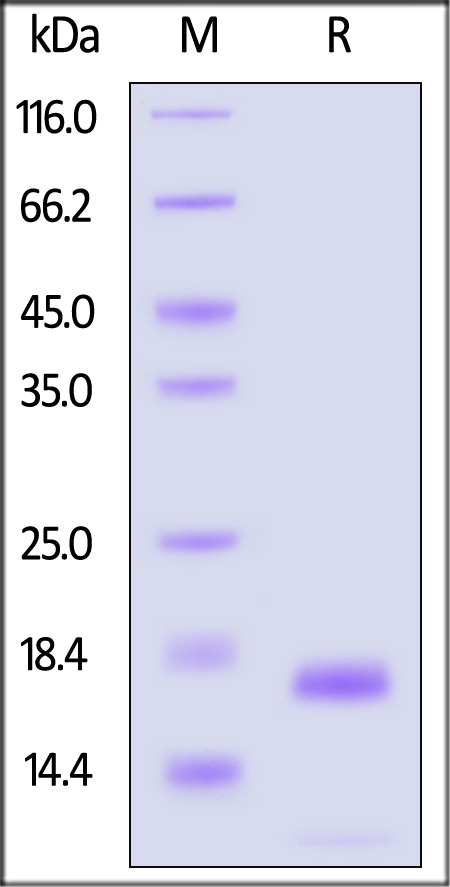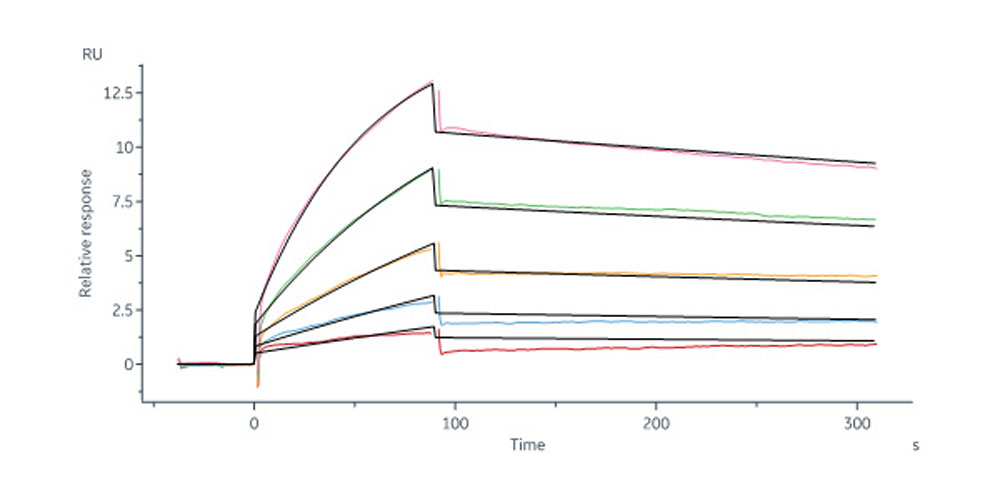分子别名(Synonym)
ALS9,ANG,Angiogenin,angiogenin, ribonuclease, RNase A family, 5,EC 3.1.27,EC:3.1.27.-
表达区间及表达系统(Source)
Human Angiogenin, His Tag (ANN-H5149) is expressed from E. coli cells. It contains AA Gln 25 - Pro 147 (Accession # P03950-1).
Predicted N-terminus: Met
Request for sequence
蛋白结构(Molecular Characterization)

This protein carries a polyhistidine tag at the N-terminus
The protein has a calculated MW of 16.0 kDa. The protein migrates as 12 kDa and 17-18 kDa under reducing (R) condition (SDS-PAGE).
内毒素(Endotoxin)
Less than 1.0 EU per μg by the LAL method.
纯度(Purity)
>90% as determined by SDS-PAGE.
制剂(Formulation)
Lyophilized from 0.22 μm filtered solution in PBS, pH7.4 with trehalose as protectant.
Contact us for customized product form or formulation.
重构方法(Reconstitution)
Please see Certificate of Analysis for specific instructions.
For best performance, we strongly recommend you to follow the reconstitution protocol provided in the CoA.
存储(Storage)
For long term storage, the product should be stored at lyophilized state at -20°C or lower.
Please avoid repeated freeze-thaw cycles.
This product is stable after storage at:
- -20°C to -70°C for 12 months in lyophilized state;
- -70°C for 3 months under sterile conditions after reconstitution.
电泳(SDS-PAGE)

Human Angiogenin, His Tag on SDS-PAGE under reducing (R) condition. The gel was stained with Coomassie Blue. The purity of the protein is greater than 90%.
活性(Bioactivity)-SPR

Human Angiogenin, His Tag (Cat. No. ANN-H5149) immobilized on CM5 Chip can bind Human Plexin B2, His Tag (Cat. No. PL2-H52H3) with an affinity constant of 17.5 nM as determined in a SPR assay (Biacore 8K) (QC tested).
Protocol
背景(Background)
Binds to actin on the surface of endothelial cells; once bound, angiogenin is endocytosed and translocated to the nucleus. Stimulates ribosomal RNA synthesis including that containing the initiation site sequences of 45S rRNA. Cleaves tRNA within anticodon loops to produce tRNA-derived stress-induced fragments (tiRNAs) which inhibit protein synthesis and triggers the assembly of stress granules (SGs). Angiogenin induces vascularization of normal and malignant tissues. Angiogenic activity is regulated by interaction with RNH1 in vivo























































 膜杰作
膜杰作 Star Staining
Star Staining











